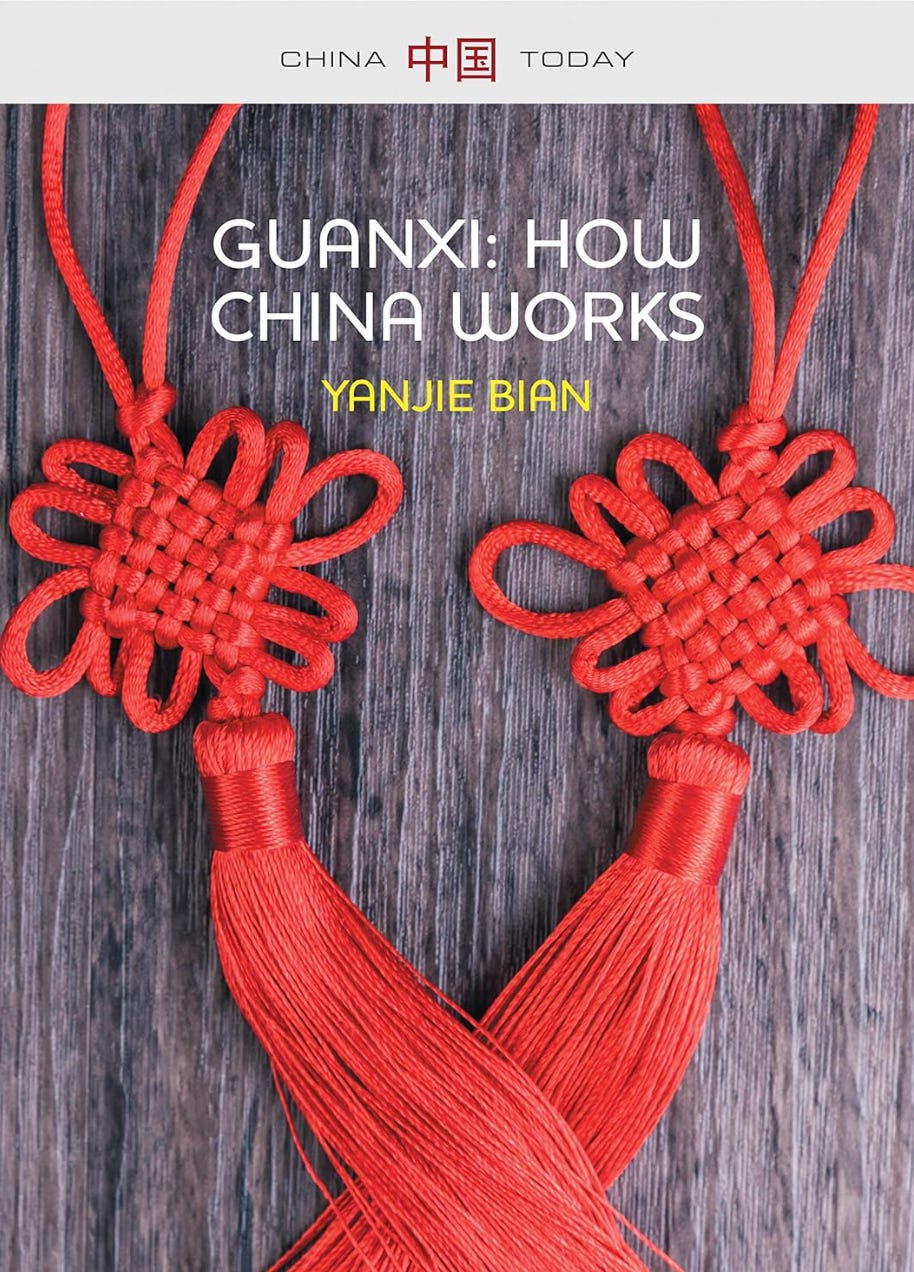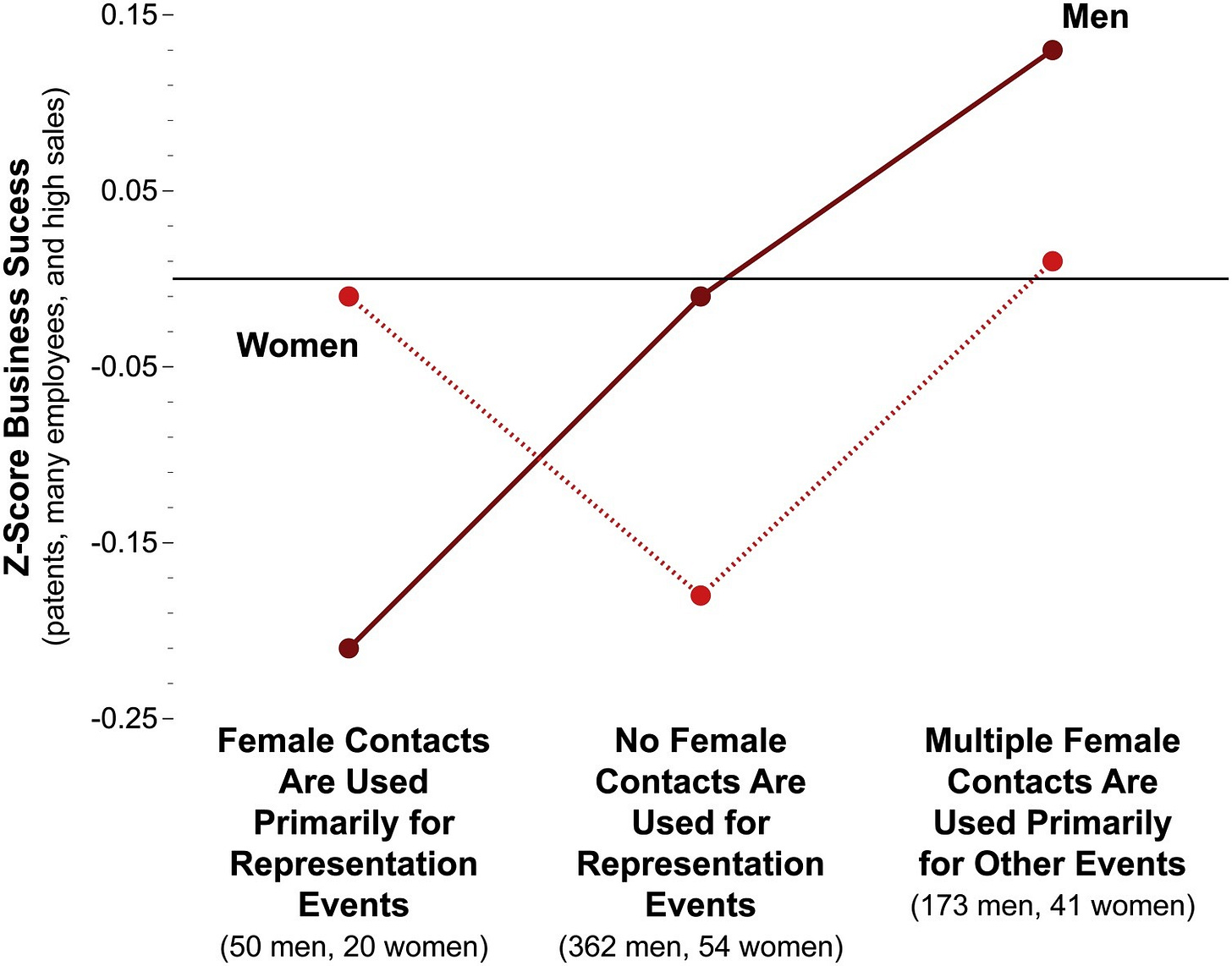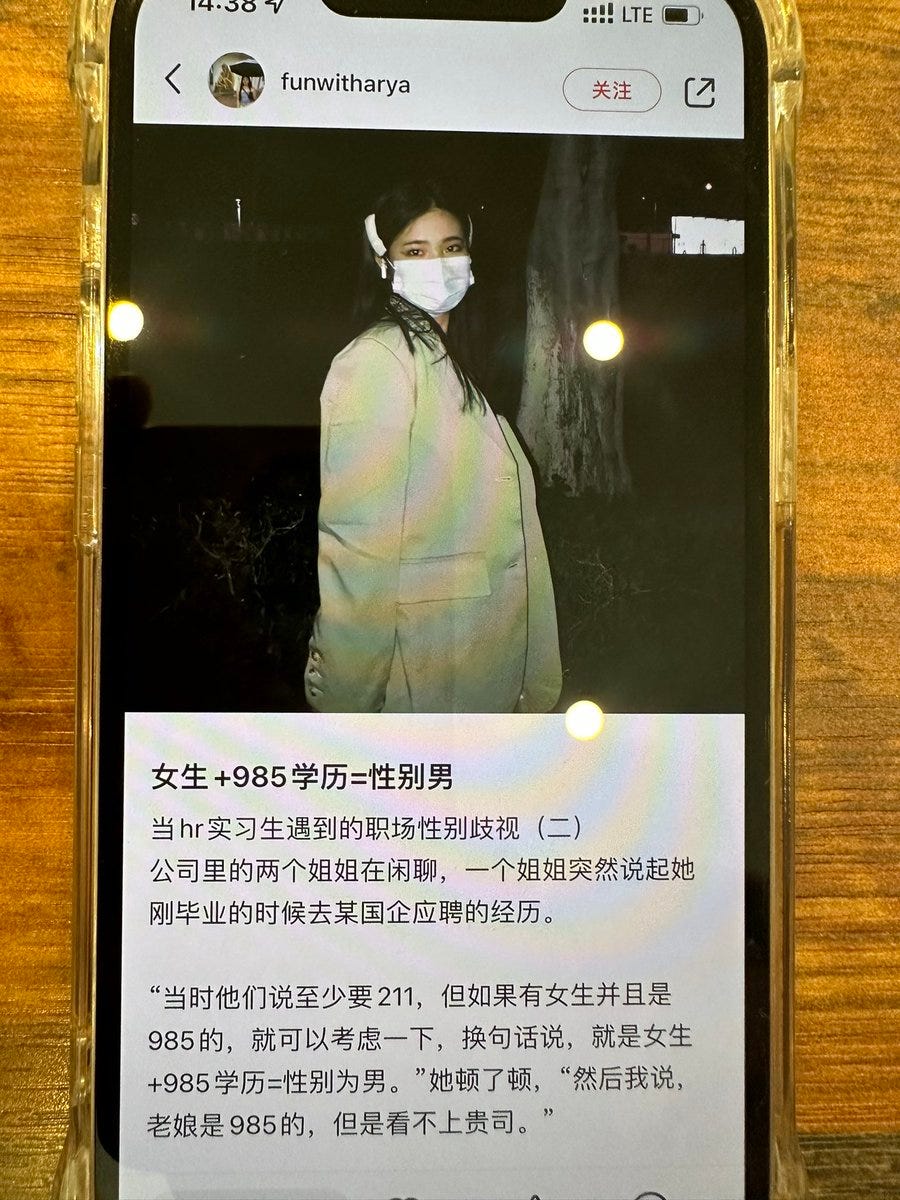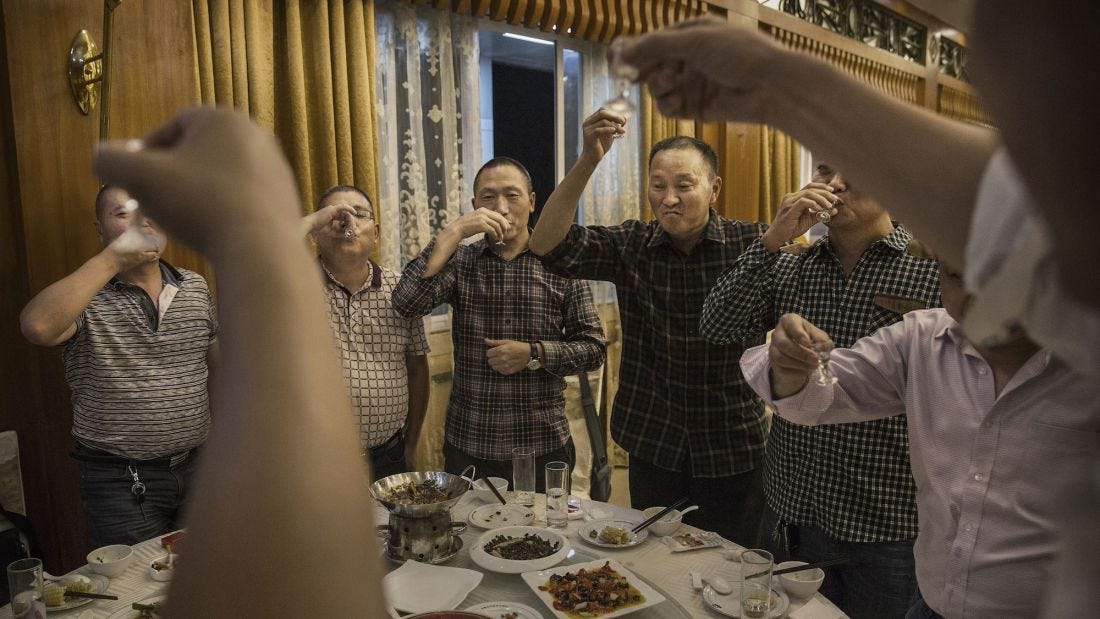Building Networks in China - Baijiu, Karaoke, and Sexy Ladies
Imagine a scene: in a highly centralised state, companies vie for land, licences, and cutting-edge technology. To secure these coveted connections, firms invest heavily in entertainment – a world of feasting, karaoke, and sexual pleasures.
This is the reality of doing business in modern China, where industrial policy has involved close coordination of firms, state-owned banks and central government. Cultivating relationships with officials is absolutely essential for success. At the heart of this system lies the concept of ‘guanxi’ – personal ties of intimacy that can make or break a business deal.
An unappreciated aspect of East Asian business culture is its exogamous nature. Unlike the tightly-knit, endogamous communities often found in the Middle East, North Africa, and South Asia, Chinese networks have historically extended beyond immediate family ties. Since there is no compunction for loyalty, entrepreneurs must constantly cultivate new alliances.
Commercial success and career advancement thus become heavily dependent on capacity to forge fraternal networks. And what’s the preferred method for bonding? Drinking, singing, and sexy ladies. While formal qualifications are valued, they’re not the complete package. In fact, job advertisements in China may explicitly call for ‘good drinking capacity’.
China’s network-heavy growth strategy rewards fraternal connections, where women entrepreneurs are distinctly unwelcome. This exclusion may help explain some stark statistics: the typical male CEO in China has no female contacts in his professional network, and the country’s gender pay gap has widened to 27%.
The Art of ‘Guanxi’
At the heart of these business dynamics lies the concept of ‘guanxi’ - a term that encompasses personal ties of intimacy, trust, and reciprocity between individuals. As sociologist Yanjie Bian explains, guanxi is nurtured through shared social activities, such as dining together, exchanging gifts at significant events, and demonstrating care and loyalty.
These guanxi networks play a pivotal role in business operations. A 2003 survey of 830 firms in the Pearl River Delta, conducted by Bian, revealed that 97% mobilised capital from guanxi networks. Notably, 62% of this capital came from non-family connections, highlighting the expansive nature of these networks.
Far from diminishing, the importance of these networks has actually grown over time. An increasing number of Chinese professionals report securing their jobs through guanxi connections rather than through formal application processes.
Dr Gong (a 30-something woman, heading a public health department) explained:
“Those of us working at these government institutions always have two jobs that we have to juggle: one is to complete our tasks (yew) and the other is to build guanxi . . . to get the support (zhichi) to do the tasks…
We rarely go home after work and spend time with family; we always have to go outwith friends, because we need the friends” (quoted by Katherine Mason).

Business Entertainment!
The cultivation of guanxi often involves entertainment, ‘yinchou’. In one of the best books I’ve read this year, Anthropologist John Osburg got a job a television co-host in Chengdu, and then accompanied colleagues to secure advertising! He got up close and personal - involved in everything from heavy drinking to fraternising with criminal thugs. His research reveals the fundamental importance of corporate entertainment:
“Many entrepreneurs I knew in Chengdu even considered entertaining and being entertained with groups of businessmen and government officials as the most essential part of their work.
As one government contractor, Mr. Wu, put it, “Entertaining is my job”.
Gift-giving is also important, as a man demonstrates his capacity to provide:
“For elite men, status derives above all from being able to deliver the goods—favors and connections, houses and handbags—to grateful dependents” (Osburg).
The Dark Underbelly: Criminal Ties
It’s worth noting that criminal thugs still play a role in Chinese business culture. You may recall my podcast with the brilliant Lynette Ong, who explains that the Chinese state frequently outsources its ‘dirty work’ (like demolitions) to criminal gangs.
Given their continued centrality, business networking may involve hosting that violent underworld. Osburg shares that at one point he was a little nervous (though evidently lived to tell the tale).
Bonds of (fictive) brotherhood
Ultimately, the goal is to consolidate trust and intimacy. While China is exogamous, new bonds are often couches in idioms of kinship, with associated expectations of loyalty:
“Business relationships were often couched in a rhetoric of male solidarity, brotherhood, paternalism, mutual aid, and yiqi (honor or a sense of obligation in personal relationships)…
Patrons and well-connected bosses are often referred to as “elder brothers” (dage)...
Associates and underlings are usually referred to as “iron brothers” (tiegemen’er) or simply “brothers” (xiongdi). They are expected to put their fictive brotherly relationships above all other commitments”
What is ‘good entertainment’?
A typical evening of yingchou (business entertaining) often begins with an elaborate banquet featuring expensive delicacies and high-end liquor. Toasting etiquette is fundamental, notes Osburg, replete with flattery. As the night progresses, the group might move to a karaoke club (KTV), where they hire a private room and a female hostess, possibly to be followed with sauna, massage parlours and sex.
To clarify, the goal isn’t really to have lots of sex, but rather to have enjoyable experiences in order to bond as brothers:
“The goal of a successful banquet or evening in a KTV is precisely to do away with protocol, to end the evening bonded together as friends (pengyou) or even fictive kinship brothers (xiongdi) through shared experiences of pleasure” (quoted by Osburg)
“When we drink the alcohol, our body feels very comfortable (shufu) and then we feel very close to each other (shuxi)” (a man explained to Katherine Mason).
Alcohol reduces people’s inhibitions, it forges trust and camaraderie. That’s why business deals are often sealed with a toast - explains Edward Slingerland, in his curiously positive case for getting “Drunk”.
My own research is entirely consistent. A Chinese businessman I interviewed emphasised corporate drinking:
“How do you build trust with a new person?
You will have a lot of entertainment.
Usually, the leaders of men and men get together, and when he goes to KTV to karaoke, he will definitely find some women. Sing and dance with them, drink wine..
If the leader and the leader invite each other to dinner, they basically have to sing.. Singing, drinking and bathing are really important…
There are many cases that the customer did not want to purchase our company’s products (when I was in the SOE), but due to drinking, drinking, drinking, drinking for a long time, the customer, finally chose the product from our company”.
[translated from Mandarin via Microsoft Translate].
In China, the path to a successful business deal seems paved with empty bottles and karaoke microphones..
Do all men enjoy it?
No, insists Osburg. This endless drinking is resented:
“In my interviews with entrepreneurs, they constantly complained about these incessant evenings of entertaining (yingchou). Many entrepreneurs had obligations five nights out of the week and longed for leisure time...
Many even characterized yingchou as their true work, and it was a major source of anxiety for these entrepreneurs. Refusing an invitation or failing to maintain a relationship through periodic evenings of entertaining had real social and financial consequences”.
Just a few years ago, a Chinese bank worker was slapped in the face for refusing to drink. This account was posted on Weibo and generated mass support. Many Chinese men are fed up and frustrated by frequent obligations to drink. One wrote,
“Some officials are not forcing you to drink alcohol.. They are asking you to demonstrate your obeisance to their orders, so they can be satisfied with their power. If you turn down their request, they will feel impotent and ashamed.”
A Chinese businessman I interviewed likewise expressed dislike - it’s absolutely exhausting, and purely instrumental:
“Many of my friends need to drink and have fun for the sake of work and performance..”
How much sex?
Corporate entertainment frequently involves female hostesses who massage male egos, making them feel charming, handsome, and desirable. The exact nature of these interactions depends on what pleases bosses and officials:
“If the boss wants to dance with naked hostesses, everyone present must oblige him and participate. To refuse to participate in an official or client’s preferred forms of play is to risk passing judgment on him and undermines the goal of fostering male solidarity. Among acquaintances, this refusal could also be interpreted as an unwillingness to deepen the relationship between them..
Hosts make every effort to ensure that their “guests” receive their choice of women and that they are provided with whatever sexual services they require” - Osburg.
What does this mean for marriages?
“Foss of belief ” (shiqu xinyang) and lack of “public-oriented morality” (gonggong daode) are frequent complaints in contemporary China, explains Osburg. There is absolutely no indication that male adultery is shamed or stigmatised. Beautiful girlfriends actually enhance a man’s status among peers.
I would add, marital love has never really been idealised in China - not in folklore, Confucianism or state institutions. Girls were socialised to marry, stay put, and obey. Sons were expected to prioritise filial piety and honour their ancestors. Bridgerton’s idealisation of courtship and marital love is distinctly European.
Corporate entertainment merely expands the social permissibility and opportunities for extramarital affairs. Osburg explains that men invest great energy into this external world of business, seldom invite their wives, and enjoy a license to indulge:
“[T]he bulk of [men’s] time and energy was devoted to relationships associated with the “outside” world of career and business, which was the primary source of an elite man’s status..
Regardless of whether they worked outside the home, wives were almost never present during evenings of entertaining.. Entrepreneurs often deliberately kept their business lives and connections separate from their wives and their wives’ social circles..
They felt that once their financial obligations to their families were satisfied, as evidenced by the material comfort in which they lived, they had a license to enjoy the fruits of their labor and the pleasures offered in the outside world of business entertaining.
[There is a] strong division between the domestic realm of responsibility and the outside world of romance and pleasure, from which their wives were mostly excluded”.
Wives’ tolerance of this behaviour varies, suggests Osburg. Cosmopolitan city women may refuse, while others turn a blind eye in exchange for material support.
How common are extra-marital affairs?
Representative data on sexuality is non-existent, so confidence intervals are large, but Osburg suggests widespread infidelity:
“Nearly all of the male entrepreneurs I worked with were married, and virtually all of them engaged in some form of extramarital sex. Nearly all patronized saunas that offered sexual services and slept with hostesses, and the majority also had girlfriends on the side…
Lovers, more than wives, were seen to reflect a man’s current status and the state of his finances”.
How does this affect views of women?
Men may signal elite status through consumption, e.g. renting sexual services.
“A favorite topic of conversation among my male research subjects involved quoting the monthly rates to bao current female models, actresses, or pop stars and speculating on the rates that up-and-coming stars could fetch.
Presumably all one needed to bao [rent] someone was the right amount of cash. The price paid however, was not only a reflection of the value of the mistress—i.e., her youth, purity, beauty, or fame…
My informants used a different verb, yang, to categorize their relationship with girlfriends and mistresses. Yang means “to provide for or take care of… Providing for multiple dependents, be they mistresses or fellow businessmen, indicated elite masculine status”
And women reinforce this expectation of provision:
“Young women even criticized men who made declarations of feelings and romantic gestures without backing them up with tangible actions and gifts”.
Again, I suggest this is entirely consistent with a tradition that has emphasised provision, rather than marital love and companionship. But these mutual expectations of materialism seem to feed into modern misogyny, with men taking to social media platforms like Baidu Teiba to portray women as grasping and greedy.

Women are blamed for infidelity
It takes two to tango, but contemporary culture puts the blame on women:
“In countless movies and television shows these young women are the dreaded “third parties” (disanzhe) who lure men (and their wealth) away from their family responsibilities.
They have been blamed for contributing to the corruption of upright officials and are often portrayed as spurring their official patrons to accept more bribes and gifts. Intellectuals and scholarly observers cite them as prime evidence of the abandonment of socialist goals such as gender equality and hold them up as examples of a more general loss of belief and values seen to be afflicting Chinese culture”.
Convicted corrupt officials have also blamed women for ‘sexual bribery’ - they are the true villains…
Female entrepreneurs perpetuate this blame-game, condemning women who trade on their looks for ‘eating the rice of youth’.

Female entrepreneurs are eyed with suspicion
Every single male entrepreneur interviewed by Osburg eyed female entrepreneurs with disdain - suspecting them of sleeping to the top. Mr. Liao, the drinks distributor, asserted that “behind every nüqiangren there’s a man supporting her”. Women had either traded on their looks or been supported by male kin. A far cry from Maoist rhetoric of ‘women holding up half the sky’.
Ms. Gao, a successful entrepreneur, articulated this dilemma, explaining that women must “sacrifice themselves”:
“She explained that even if one doesn’t literally sacrifice one’s body to achieve success, women will sacrifice their reputation, femininity, and ultimately their marriageability.
Because of her status as both an entrepreneur and a member of the entertainment world, men often assumed that Ms. Gao used her sexuality freely in her business dealings.
This was apparent in the way some of my other informants perceived Ms. Gao. One evening, after introducing her to Mr. Wang, he whispered to me with disgust, “Just think how many men a woman like that has slept with.”
That said, Ms. Gao thought that as a woman she was more skilled at ‘goudui’ and flattering men - though regrettably some misinterpreted this as invitations…
Now here’s Catch 22: women entrepreneurs who refuse to act as mistresses are resented. Damned if you do, damn’t if you don’t!
Curiously, ‘white collar women’ are still seen (and portrayed in popular books and movies) as pure and demure - having quality (suzhi). Working in offices, they are perfectly respectable. It’s the dirty world of business that is distinctly polluting.
Businesswomen are often excluded
Even if female entrepreneurs wanted to partake, they are distinctly unwelcome. Osburg states it plainly:
“the vast majority of entrepreneurs in post-Mao China are men.
This is largely due to the fact that business networking requires entering spaces (such as nightclubs and saunas) and participating in activities (drinking, gambling, and sex consumption) that are not viewed as appropriate for “proper” women”
He provides several examples of this exclusion:
Ms. Liu, a mining boss, was expected to pay for a hostess and then leave so that the men could have their fun. Wherever possible, she subcontracted 'goudui' work to local men.
Ms. Gao, the owner of a public relations company, shared that she does participate in entertainment (banqueting, drinking and karaoke), but felt unable to challenge the group - for fear of being branded an 'alien' or an 'eccentric'.
Men expressly sought to preserve a male-only space. Mr Wu insisted,
“I don’t like it when women [businesswomen] are there. It’s hard to let loose”.
As Katherine Mason similarly observed,
“Banqueting men dominated positions of power, and it was relationships with these powerful men that continued to be most important for women’s advancement. Because of this, the consumption of alcohol retained a considerable degree of importance. Those who, like Lu, abstained from drinking entirely, simply did not advance”.
Employment discrimination
If firms gain comparative advantage through building fraternal rapport and spending heavily on entertainment, then this may encourage preference for men. On Little Red Book (a Chinese social media app), women have reported this exact bias. A young Chinese woman showed me this grievance:
“A company came to recruit. They prefer a male who failed four courses over a women. A guy said they only want men who can drink (because drinking is part of business deals)”.
Even if women were invited, they might not necessarily wish to join. Freed from their inhibitions, drinkers loosen up. They do things they wouldn’t do in polite society. This holds for both business conversations and sexual mores. Women who drink may also be blamed for assault.
Quantifying fraternal networks
Now look at some hard data. Ronald Burt’s survey of 700 CEOs in manufacturing industries around the Yangtze River Delta provides a stark illustration of gender disparities in business networks. Female CEOs comprised 16% of this sample, already indicating a significant gender imbalance at the top.
But the real eye-opener? The most common scenario for both male and female CEOs is to have ZERO female contacts in their business network at all. A whopping 38.1% of male CEOs (223 out of 585) reported networks composed entirely of men. Even more surprisingly, 22.6% of female CEOs (26 out of 115) also reported all-male networks.
It’s generally rare for any CEO's network to contain more than two female contacts, when this does occur, it's more likely to be in the networks of female entrepreneurs. These numbers paint a picture of a business landscape where women are not just underrepresented, but often entirely absent from the critical networks that drive success.
Men do front-facing work
In his study of Chinese entrepreneurs, Ronald Burt uncovers an intriguing gender pattern. The key distinction lies in what Burt terms ‘representation events’ - activities that involve publicly representing the business, such as founding the company, dealing with suppliers, and managing customer relationships. Both male and female entrepreneurs show a marked preference for male contacts in these public-facing roles, reflecting conservative attitudes about gender in Chinese business culture.
Women, on the other hand, are more frequently cited as valuable contacts for internal, technical matters that occur behind the scenes. These include areas such as finance, government paperwork, and production technology.
Figure 7 shows that entrepreneurs who primarily use female contacts for representation events tend to have lower average success, while those who have multiple female contacts but use them primarily for non-representation events enjoy the highest average success. Interestingly, this pattern is more pronounced for male entrepreneurs than for female entrepreneurs.
Table 7 in Burt’s paper underscores this preference for male contacts in representation. For male entrepreneurs, 45% of events involving male contacts are representation events, compared to only 29% for events involving female contacts. Female entrepreneurs display a similar, though slightly less pronounced, pattern.
This suggests that women are valued, but men are preferred for public-facing roles.
The Widening Chasm: Gender Pay Gap in the People's Republic
Recent economics papers show that China’s labour market is marked by widening gender pay gaps, primarily in the private sector.
Liu and Zuo (2023) track the gender wage gap in urban China from 1988 to 2016. Within private sector, latest estimates indicates it is about 27% at the median. That holds controlling for age, years of education and city fixed effects.
Curiously, even though the gender pay gap is smaller in State-Owned Enterprises, it’s actually become much harder for women to land these jobs.
Adding to this story, Xiao-Yuan Dong and Veronica Mendizabal Joffre find that 74% of Chinese managers are male.
Given the qualitative and quantitative evidence, I wonder if the rising importance of fraternal guanxi is contributing to growing labour market inequalities? Chinese women certainly believe the game is rigged and their qualifications are not enough.
This woman says “A woman + 985 = male”.
985 means a prestigious university.
So an exceptionally clever and qualified female is equal to a mediocre male.
Another user invites women to share their experiences of employment discrimination. One replies that she went to a recruitment fair where they openly told women, “don’t bother applying” (i.e. we want men).
Conclusion: The Cost of Cronyism
Under China’s state, firms gain comparative advantage through forging relationships of trust and intimacy. Securing insider information, lucrative contracts and frontier technology still depends on guanxi.
Without fixed obligations to tribe or gotra, Chinese entrepreneurs can forge connections with almost anyone. But this same system of exogamy motivates relentless relationship-building: bonding over drinks and girls to access preferential contracts and state protection.
Given the financial importance of consuming fast quantities of baijiu and letting loose with the boys, women’s qualifications do not actually level the playing field. China’s network-heavy growth strategy may be fuelling its rising gender pay gap.
Methodology!
One more thing! Osburg’s qualitative research brilliantly reveals how fraternal networks reinforce discrimination and misogyny. His participants were open, welcoming and seriously frank. I doubt I could have secured this same data - at least not safely.
Men have privileged access to male networks and can thus make enormously important to our understanding of what lubricates modern inequalities. Thank you John Osburg!
Related Essays
Further Readings
Xiao-Yuan Dong and Veronica Mendizabal Joffre, 2019, Inclusive Growth in the People’s Republic of China: A Deep Look at Men and Women’s Work Amid Demographic, Technological, and Structural Transformations
Xueyue Liu and Sharon Xuejing Zuo, From equality to polarization: Changes in urban China’s gender earnings gap from 1988 to 2016
Donghe Lyu, 2023, The Gender Wage Gap in China: Learning from Recent Longitudinal Data
Li et al, 2024, Labor market segmentation and the gender wage gap: Evidence from China
John Osburg, Anxious Wealth: Money and Morality Among China's New Rich























This might explain part of why business and commerce were historically thought of as polluting in Confucianist thought